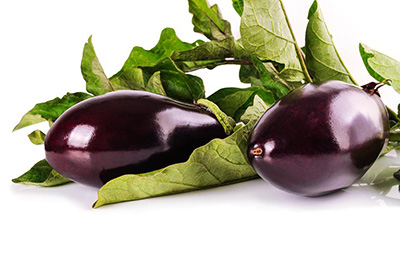 Botanically, eggplant is a fruit and classified as a berry.
Botanically, eggplant is a fruit and classified as a berry.
Culinarily, they are classified as a vegetable since they’re used in recipes as a savory addition rather than a sweet one.
Background
- Eggplant is part of the Solanaceae botanical family that includes multiple foods like tomato, potato, tomatillo, bell pepper, and ground cherry.
- Eggplant is also known as aubergine in the UK and brinjal in India.
Nutrition
Eggplant is a good source of fiber and manganese.
- Fiber makes you feel fuller faster which helps to control weight while also supporting digestion and prevention of constipation.
- Manganese is beneficial in wound healing and cartilage and bone formation. It also supports the metabolism of carbohydrates, protein, and cholesterol.
How to purchase, prepare and store
- Purchase eggplants year-round at grocery stores or at your local farmer’s market during the summer.
- Choose eggplants with smooth, shiny skin and a firm, green stem. Avoid those with soft spots, bruises, or wrinkled skin.
- Small and medium-sized eggplants will have a better flavor. As eggplants get larger, they tend to taste bitter.
- Prepare the eggplant by slicing off the stem and bottom portion. Remove the skin using a vegetable peeler or paring knife.
- Cut the eggplant into round slices, cubes, or strips. Then, place the prepared eggplant on a baking sheet lined with paper towel.
- Salt eggplant on both sides; let sit until the pieces begin to sweat, around 30 minutes. This draws out bitterness.
- Rinse off the salt and pat dry with a paper towel.
- Store fresh, whole eggplants at room temperature for two to five days as eggplants are sensitive to the cold.
- Keep away from fruits and vegetables that emit ethylene such as apples or bananas as these make the eggplant ripen faster.
- Store in the refrigerator if your space is hot and humid. Keep in a crisper drawer for up to seven days.
Nutrition Facts
Eggplant, 1 cup, cooked, boiled, drained
- Calories: 34.6
- Protein: 0.822 g
- Fat: 0.228 g
- Carbohydrate: 8.64 g
- Fiber: 2.48 g
- Calcium: 5.94 mg
- Iron: .247 mg
- Magnesium: 10.9 mg
- Phosphorus: 14.8 mg
- Folate: 13.9 µg
- Vitamin A: 36.6 µg
Via fdc.nal.usda.gov
Recipes
Request an Appointment